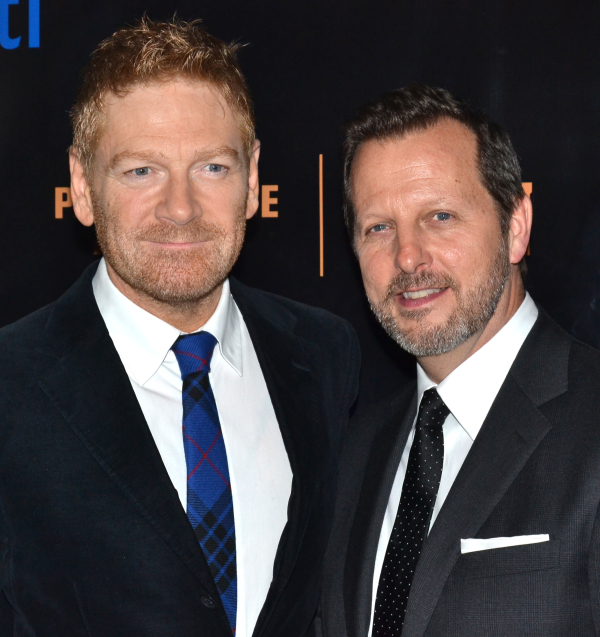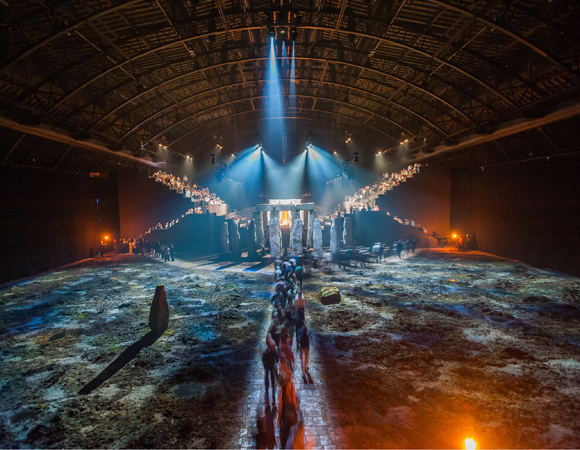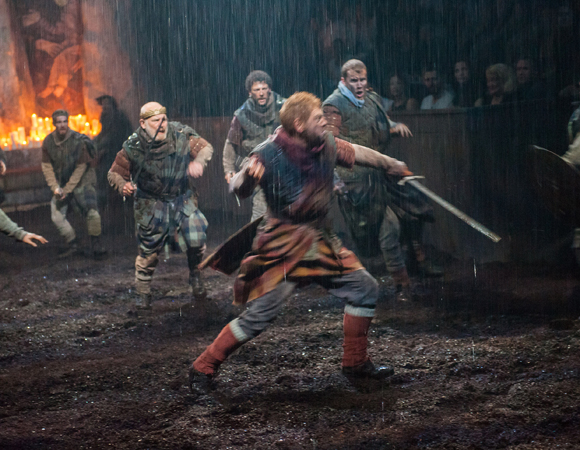After Making a Name for Himself in Musicals, Rob Ashford Reinvents Macbeth With Kenneth Branagh
Rob Ashford has a lot of musicals on his résumé — as choreographer, The Wedding Singer, Curtains, and his Tony-winning Thoroughly Modern Millie; as director, Promises, Promises and How to Succeed in Business Without Really Trying, among others. Yet Broadway audiences don't really know the full extent of his skills. In the United Kingdom, Ashford has made a name for himself staging very well-received productions of Eugene O'Neill's Anna Christie and Tennessee Williams' A Streetcar Named Desire.

(© David Gordon)
New York audiences have had the chance to see his work on straight plays only once — the 2013 Broadway revival of Williams' Cat on a Hot Tin Roof — but now, that's changing. Ashford is at the helm of the Park Avenue Armory production of William Shakespeare's Macbeth, starring (and codirected by) legendary Shakespearean Kenneth Branagh. The immersive production, which originated at the Manchester International Festival, serves as Branagh's New York stage debut and Ashford's first time working on a Shakespeare play. Ashford spoke with TheaterMania about collaborating with those titans of the stage — Branagh and Shakespeare — and shared his thoughts on why this experience is unlike any other.
How did you come to join Kenneth Branagh in directing this production?
Alex Poots, who is the artistic director of the Manchester Festival and the Park Avenue Armory, had seen the Anna Christie that I had done at the Donmar with Jude Law, and he loved it. When he was speaking to Ken about doing Macbeth and they were talking about who Ken might collaborate with, Alex said, "I know the guy," and called me. I was, of course, interested.
What's it like to work on a Shakespeare play for the first time?
It was daunting, at first. There was lots of homework, which was actually pretty exciting. I didn't mind going home every night and doing the work and figuring out what the text meant or could mean, and try to be able to make myself as familiar with it as he was. It was really exciting once we got into it. Ken is such a great leader, and a leader by example as far as the text goes. It's good to challenge yourself from time to time.
Was there a particular way in which you both collaborated as directors?
We never ever really defined anything like that. Macbeth is a big role and he wanted to play it and he wanted to play it well. We shared all the design ideas and we shared the casting. We still continue to collaborate, but he has a lot on his plate as Macbeth. We really just worked in tandem, and it was great to have him there as your leading man and codirector. It can be lonely sometimes, the directing thing, so it is really nice to have a partner. We found it helpful that he's on the inside of the play and I'm on the outside. I listen to what he says about focus and pacing, and I report back on the bigger picture.
How did you decide to pare down the text?
One of the first things Ken said to me was, "Let's do it in two hours with no intermission," and that sounded perfect. We cut a lot of the witch stuff; "eye of newt, toe of frog" and all that. It's become kind of comical now because it's so well known. We said, "Let's concentrate our use of the Weird Sisters" and, with less real estate, make them pay off. We tried to minimize their time and maximize their impact.

(© Stephanie Berger)
Part of the fun of the show is the walk through the Armory, when the audience is gathered into clans and then brought into the space and sent on a journey through a heath.
It is fun, isn't it? We couldn't do that in Manchester. We wanted to maintain the same spirit and the vibe of the show. We liked the jousting and the floor of mud. We had a good end and a bad end in the church, an end where the candles were lit and with a crucifix, and then the end that the witches had already defiled. We wanted to replicate that but embrace the Armory itself. We didn't want to build a church in the middle of the place. When we were in Manchester, the audience met at an abandoned mill three blocks away and we walked them over in clans. This part of the experience was a spooky walk in a derelict neighborhood. That was the idea of the heath [at the Armory] and all those great rooms for the clans to gather, and the bell that's part of the Armory to call the clans.
Ken has never done a show in New York before. Was he apprehensive about making his debut in this manner?
Not really. He was excited, more than anything. He hasn't avoided New York intentionally; it's just that it's never happened before. Maybe because it was meant to happen now. But he was excited about it. I find it thrilling to watch him, and I've seen it a few times now.
The run is basically sold out — is there yet another life for the production?
We were only really planning to do it once, at this deconsecrated church in Manchester. The Armory said, "We'd love to have you" and we felt, Ken felt and I felt, the three weeks in Manchester might not have been enough. We were happy to take them up on their offer. So who knows if it'll have another life? We never thought we'd have a life after Manchester.

(© Stephanie Berger)











